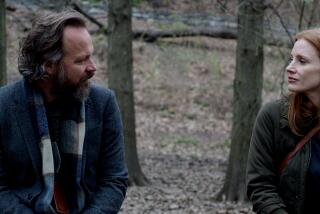Improbability takes the life out of ‘Dying’
- Share via
Craig Lucas’ “The Dying Gaul” begins promisingly only to lapse into an increasingly improbable and overly familiar tale about how rotten Hollywood industryites can be, as the formidable talents and skills of Patricia Clarkson, Peter Sarsgaard and Campbell Scott actually command attention longer than their material warrants. That Lucas wrote the screenplay for the landmark gay film “Longtime Companion” and that he and Scott collaborated on the distinctive “The Secret Life of Dentists” makes “The Dying Gaul” seem all the more disappointing.
Sarsgaard’s aspiring screenwriter Robert is summoned to a meeting at Paramount by Scott’s Jeffrey, a smooth-talking producer sufficiently impressed to offer a cool million for Robert’s script, “The Dying Gaul.” Highly autobiographical, with its title taken from the ancient Roman statue, it is a love story between two men, one dying from AIDS. Only months before Robert lost his lover, who was also his agent.
The year is 1995, and there is a catch: Even though Jeffrey says that Gus Van Sant has read “The Dying Gaul” and is also impressed with it, he stipulates that Robert change the dying Maurice to Maggie. Robert reflexively refuses, then thinks about his debts, his son’s future and the 15 other scripts that never got made and swiftly capitulates. Jeffrey declares flatly that “Americans hate gays” and that as written “The Dying Gaul” will never, ever be made in Hollywood. While 1995 was not 2005, the year of the upcoming “Brokeback Mountain,” there were certainly numerous independent companies a decade ago, including Strand Releasing, which is distributing this film, that would have been interested in Robert’s script.
In any event, once Robert signs the contract he is quickly taken up by Jeffrey and his elegant, witty wife Elaine (Clarkson), a former screenwriter, who live in a sterile, ostentatious Malibu palazzo with their two small children. Jeffrey quickly reveals his bisexuality, seducing Robert, while Elaine, adopting a male persona in an online gay chat room, engages Robert in intense conversations, at once tantalizing and disturbing. Lucas adapted his film from his play, and while “The Dying Gaul” may have inspired a willing suspension of disbelief on the stage, it fails to do so on the screen. Why does it never occur to Robert that Elaine is the person sending those messages? That this defies credibility makes it all the more difficult to believe for a moment that Robert, even though grief-stricken and vulnerable, could really believe he might be receiving messages from his dead lover, or that Elaine is oblivious to Jeffrey’s bisexuality.
Although “The Dying Gaul” tries to evoke the pathos of Greek tragedy and the stars strive heroically, there’s none of the requisite grandeur in this trio of creeps to make it worth caring what happens to them.
*
‘The Dying Gaul’
MPAA rating: Rated R for sexual content and language
Times guidelines: Some sexuality, blunt sexual language and adult themes and situations
A Strand Releasing and Holedigger Studios presentation. Writer-director Craig Lucas; based upon his play. Producers Campbell Scott, George Van Buskirk. Cinematographer Bobby Bukowski. Editor Andy Keir. Music Steve Reich. Costumes Danny Glicker. Production designer Vincent Jefferds. Art director G. Victoria Ruskin. Set decorator Stephanie S. Ziemer. Running time: 1 hour, 45 minutes.
At selected theaters.
More to Read
Only good movies
Get the Indie Focus newsletter, Mark Olsen's weekly guide to the world of cinema.
You may occasionally receive promotional content from the Los Angeles Times.









